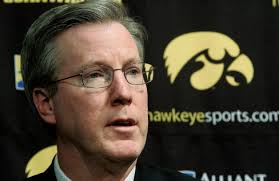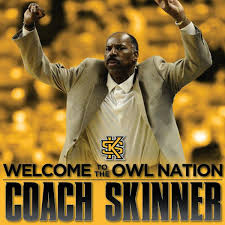Fran McCaffery became a D-1 head coach at Lehigh in 1985 and he has not stopped winning for the past 3 decades. He made the NCAA tourney during his final year with the Mountain Hawks, then made it back with UNC-Greensboro in 2001, then 3 straight times with Siena from 2008-2010, followed by back-to-back appearances with Iowa the past 2 years. After destroying Davidson by 31 PTS in their opening tourney game last March, they had a 3rd round loss after running into a Gonzaga team that shot 61.5 FG%. However, the Hawkeyes return 4 of their starters from that game, which gives them an excellent chance to return to the tourney for the 3rd straight year. HoopsHD’s Jon Teitel continues his season preview series by chatting with Coach McCaffery about playing for Penn and taking so many different schools to the NCAA tourney.
In your playing days you were nicknamed “White Magic”: who gave you the nickname, and how did you like it? I got it from Julius Thompson, who was a sportswriter at the Philadelphia Bulletin. I was playing in the predominantly-Black Sonny Hill League with Lewis Lloyd, who was known as “Black Magic”, so Julius decided to call me “White Magic”.
After transferring from Wake Forest to Penn you were among the Ivy League leaders in STL/AST in 1982 before a 10-PT loss to St. John’s in the NCAA tourney: why did you decide to transfer, and could you tell at the time that Chris Mullin was going to become a star? Penn was my 2nd college choice. As a member of the high school class of 1977 I was ineligible to play as a freshman at Penn, but I had a great experience at Wake Forest and after transferring to Penn I still had the same amount of eligibility. Mullin was only a freshman but you could tell that he was special. He was really difficult to guard and had a big strong body.
You became an assistant coach at Lehigh in 1983, and in 1985 you became the youngest head coach in D-1 at age 26: did you feel that your age was an advantage or a disadvantage? It was both. It was an advantage in that I could relate well to the players and I had tremendous enthusiasm. We also got a lot of publicity for having such a young coach! However, at times we did not always get the respect we deserved or would have had if I was a more established coach. Lehigh and Lafayette have 1 of the biggest rivalries in college sports. I became head coach when Lafayette’s head coach was Butch van Breda Kolff (who had coached Wilt Chamberlain and the Lakers to Game 7 of the 1969 NBA Finals), and we had some great battles.
What are your memories of the 1988 NCAA tourney (Tim Perry/Mark Macon combined for 51 PTS/21 REB in a win by #1-seed/in-state rival Temple)? We played really well and had a number of seniors who were bona-fide D-1 players, but we did not have a deep team. We made 10 threes and defended hard, so it was still close with 3 minutes to go.
Take me through the 1992 NIT Final 4 as an assistant coach at Notre Dame under John MacLeod:
Utah coach Rick Majerus picked up a technical foul in the final 10 seconds of a tie game after Paul Afeaki was called for pushing LaPhonso Ellis, and the resulting FT gave you a 3-PT win over the Utes: how did it feel to win the game on a technical foul? It was ironic. We had a 1-PT loss at DePaul in 1 of our final regular-season games earlier that month on a ridiculous technical foul that was called on Coach MacLeod, and if we had won that game we would have been in the NCAA tourney, so it was justice served!
Elmer Bennett scored 39 PTS including a 3-PT shot with 4 seconds left in regulation to send it into OT, but tourney MVP Bryant Stith had 24 PTS in a 5-PT win by Virginia in the title game: where does Bennett’s performance/clutch shot rank among the best you have ever seen, and what was the feeling like in your locker room afterwards? It was a very interesting game. I got to work with the guards and Elmer was 1 of my favorites. He was just on fire that night: to see him have that kind of performance in that venue was really impressive. I felt we were going to end up winning in OT after his shot went in, but we could not close it.
What are your memories of the 2001 SoCon tourney final as head coach at UNC-Greensboro (Jay Joseph threw a 75-foot pass to David Schuck who made a lay-up off the glass at the buzzer for a 1-PT win over Chattanooga that clinched the 1st SoCon title in school history)? We had repeatedly worked on that play in practice, including earlier that morning. There was confusion on our bench regarding whether we had a timeout left, but once we realized that we were out of timeouts we switched the call to run that play. The key to that play is always the guy who throws the pass. We missed some FTs at the end and Chattanooga took the lead with 2.9 seconds left, so there were people standing by the court getting ready to celebrate before David made that shot.
As coach at Siena you maintained a near-100% graduation rate for your players who completed their NCAA eligibility: how much importance do you place on academics? There is 1 guy who was 3 credits short because he listened to his agent and decided to go pro, but he eventually graduated. I have placed great importance on academics everywhere that I have been. A lot of coaches only want to take credit for their team graduation rate when it is very high and blame someone else if it is very low, but it was 1 of the reasons that I got hired.
In 2008 you became the 1st coach to take 3 different programs to the NCAA tourney from a 1-bid league: how have you been able to have so much success at so many different schools? You have to be at institutions where you work for great athletic directors and can sell the experience to kids who want to go to school there. I have also surrounded myself with great assistant coaches who recruit student-athletes of great character. My greatest strength is giving my players enough structure to be successful and then letting them play. When you are in a 1-bid league you know that you are going to have to win 3 games in early-March just to get into the NCAA tourney. When there is that much at stake you need to keep your guys relaxed and feeling good about who they are.
In the 2009 NCAA tourney Ronald Moore made a 3-PT shot with 4 seconds left in the 2nd OT after making a three from the same spot in the 1st OT for a 2-PT 2-OT win over Ohio State (who was led by Evan Turner with 25 PTS/9 REB/8 AST): where does that rank among the greatest wins of your career? That is probably the most enjoyable game for me personally. We lost the 2007 conference title game when Ronald was a freshman. He missed 2 shots late in that game and I got a lot of criticism for letting him take those shots, but he did so in the flow of the offense so I had confidence in him. Fast-forward 2 years later and he makes 2 of the biggest shots in Siena basketball history. We thought that we had a good game plan but just could not simulate the Buckeyes’ length/quickness in practice. Once we got back into the game without panicking you could sense the entire momentum shifting, and I knew it would go down to the wire.
What are your goals for next season knowing that you are returning 5 of your top-7 scorers? We are very optimistic…but at the same time we are realistic because of the conference we are in. There are so many good teams in this league. You hear coaches complain that their league does not get enough respect, but the Big 10 gets plenty of respect as 1 of the best conference in the country. We have to temper our enthusiasm with some realism, but I think we have made progress and I think we have a legitimate chance to get back to the tourney next year.





Hoops HD August Session
On this month’s offseason episode, Kyle goes to the NCAA Library in Indianapolis. How exciting!!!
David Griggs is absolutely thrilled to hear about all the research he’s been doing. So, we get an update from Kyle on what he saw and experienced while at the NCAA HQ, and an update on the College Basketball Database that he’s been putting together for the site. It’s coming!! We promise!!
In addition to Kyle, Chad is joined by Jon, John and David. The panel discusses the NLRB ruling and how that impacts not just college basketball, but all college sports. They also talk about the two new selection committee members this year, and whether or not the imbalance of FBS representatives vs non-FBS representatives will matter. They also touch on what’s happening at North Carolina, and how the NCAA’s thinly spread enforcement staff could be contributing to why they’ve been so slow to act.
Last but not least, they go over the rules changes and discuss what impacts they feel it will have on the game this upcoming season
…and for all you radio lovers out there, below is an mp3 version of the show….